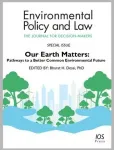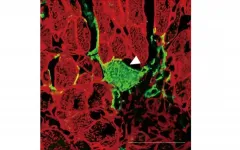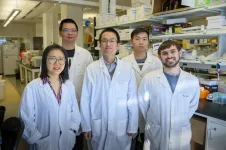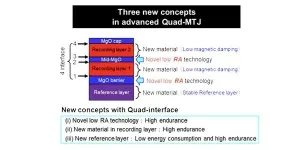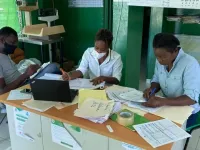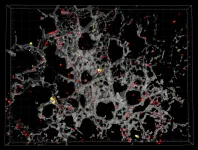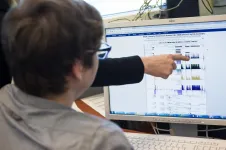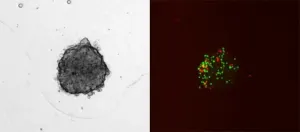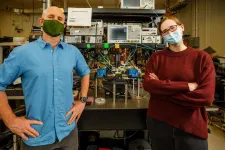Laser physics: Two-stage particle-beam booster
2021-06-02
In collaborative international effort, laser physicists at LMU have built the first hybrid plasma accelerator.
Particle accelerators have made crucial contributions to some of the most spectacular scientific discoveries of modern times, and greatly augmented our knowledge of the structure of matter. Now a team of laser physicists led by Prof. Stefan Karsch at the Ludwig-Maximilian University (LMU) in Munich and the Max Planck Institute for Quantum Optics, in cooperation with scientists based at the Helmholtz Centre in Dresden-Rossendorf (HZDR), the Laboratoire d'Optique Appliquée in Paris (LOA), Strathclyde University in Glasgow and the DESY Electron Synchrotron in Hamburg, have now achieved a significant ...
Current global environmental law and policy are failing, experts say
2021-06-02
Amsterdam, June 2, 2021 - On the eve of the 50th anniversary of the 1972 Stockholm conference that created the United Nations Environmental Programme, it is clear that the global environmental situation has only deteriorated. In "Our Earth Matters: Pathways to a Better Common Environmental Future," an extended special issue of Environmental Policy and Law (EPL), leading scholars from more than five continents call for an honest introspection of what has been attained over the last 50 years relating to regulatory processes and laws and explore future trajectories with new ideas and frameworks for environmental governance in the 21st century.
"Our objective is to fire the imaginations of scholars and decision-makers to re-examine current approaches and to explore the future, ...
New study reveals how smoking during puberty can cause negative consequences in offspring
2021-06-02
Smoking in early puberty in boys may have negative consequences for their future generations of offspring, a study from the University of Bergen (UiB) shows.
By continued analysis of data gathered in the large international RHINESSA, RHINE and ECRHS studies, researchers have found that the health of future generations depends on actions and decisions made by young people today. This is particularly relevant for boys in early puberty and mothers/grandmothers both pre-pregnancy and during pregnancy, the study shows.
The paper "Prenatal and prepubertal exposures to tobacco smoke in ...
Anyone can get super-hearing
2021-06-02
Humans can observe what and where something happens around them with their hearing, as long as sound frequencies lie between 20 Hz and 20 000 Hz. Researchers at Aalto University have now developed a new audio technique that enables people to also hear ultrasonic sources that generate sound at frequencies above 20,000 Hz with simultaneous perception of their direction. The results have been published in Scientific Reports on 2 June 2021.
'In our study, we used bats in their natural habitat as sources of ultrasonic sound. With our new technique, we can now hear the directions-of-arrival of bat sounds, which means we can track bats in flight and hear where they are - we're ...
Astronomers discover a massive star cluster, of intermediate age, in the constellation Scutum
2021-06-02
An international team of astrophysicists led by the Stellar Astrophysics Group of the University of Alicante (UA), the Instituto de Astrofísica de Canarias (IAC), and the University of Valparaíso (Chile) has discovered a massive cluster of stars of intermediate age in the direction of the Scutum constellation. This object, which has been named Valparaíso 1, lies some seven thousand light years away from the Sun, and contains at least fifteen thousand stars. To detect it, observations have been combined from ESA's Gaia satellite, and various ground-based telescopes, ...
Converting scar tissue to heart muscle after a heart attack
2021-06-02
Tsukuba, Japan - It is estimated that during a heart attack, one billion cells in the heart are lost. In the wake of the heart attack, the lost tissue is replaced by scar tissue, which can lead to heart failure, arrhythmia and death. In a new study, researchers from the University of Tsukuba have shown how cells in the scar tissue can be converted to heart muscle cells, effectively regenerating the injured heart.
The injured heart of humans and rodents alike does not have the capacity to regenerate after injury. Therefore, the only way for the heart to heal the wound is to build a scar tissue in the injured area. A longstanding goal in the field has been to find a way to reprogram fibroblasts, ...
Magnesium ions injected directly into compromised bone accelerate bone regeneration
2021-06-02
Bone-regenerating treatments are in high demand due to the ageing population. Increasingly, the orthopaedic biomaterials used to support these treatments are designed to be "immunomodulatory", i.e., guide the body's inflammatory response. They do this by encouraging macrophages - a type of white blood cell that surrounds and kills microorganisms - to adopt new roles based on signals and stimuli in their microenvironment. This approach has proved effective for developing new bone and for encouraging existing bone to accept artificial implants.
Magnesium is a mineral that not only helps to maintain normal nerve and ...
Central Oregon bat survey shows value and scale-up potential of citizen science
2021-06-02
BEND, Ore. - Bat researchers say a project in Central Oregon shows citizen science's strong potential for helping ecologists learn more about one of the least understood groups of mammals.
Volunteers listened for the rare spotted bat, Euderma maculatum, within study grids in a 24,000-square-kilometer area in and around the Deschutes and Ochoco national forests. They completed a total of 61 surveys and heard the bat 25 times.
Bat encounters help fill in holes in basic information regarding species abundance and distribution - gaps that impede conservation - and the ...
Low-wage earners spent less time at home during early pandemic lockdown
2021-06-02
FAYETTEVILLE, Ark. - Fine-grained location data gleaned from mobile phones shows that people living in less affluent neighborhoods spent less time at home during the early lockdown and first several months of the coronavirus pandemic.
Researchers tracked data from millions of mobile phone users in the largest U.S. metropolitan areas. Their findings contribute to a growing body of research suggesting that low-wage earners -- a vulnerable group already at greater risk for contracting COVID-19 -- could not afford to comply with stay-at-home orders or worked in ...
A 'jolt' for ocean carbon sequestration
2021-06-02
Global oceans absorb about 25% of the carbon dioxide released into the atmosphere when fossil fuels are burned. Electricity-eating bacteria known as photoferrotrophs could provide a boost to this essential process, according to new research from Washington University in St. Louis.
Scientists led by Arpita Bose, assistant professor of biology in Arts & Sciences, found that bacteria found in brackish sediments can "eat" electricity and, in the process, absorb and lock away climate-warming carbon dioxide. This unusual skill was previously thought to be almost exclusive to freshwater bacteria, but may be common ...
People who eat a healthy diet including whole fruits may be less likely to develop diabetes
2021-06-02
WASHINGTON--A new study finds people who consume two servings of fruit per day have 36 percent lower odds of developing type 2 diabetes than those who consume less than half a serving. The research was published in the Endocrine Society's Journal of Clinical Endocrinology & Metabolism.
Diabetes is a disease where people have too much sugar in their bloodstream, and it is a huge public health burden. Approximately 463 million adults worldwide were living with diabetes in 2019, and by 2045 this number is expected to rise to 700 million. An estimated 374 million people are at increased risk of developing type 2 diabetes, the most common form of the disease. A healthy diet and lifestyle can play a major role in lowering a person's diabetes risk.
"We ...
Target protein identified for improving heart attack treatment
2021-06-02
A new study led by researchers at Washington State University has identified a protein that could be the key to improving treatment outcomes after a heart attack.
Published in the Journal of Biological Chemistry, the research suggests that protein kinase A (PKA) plays a role in heart muscle cell necrosis, a major type of cell death that commonly occurs after reperfusion therapy, the treatment used to unblock arteries and restore blood flow after a heart attack.
"Our study has found that turning off a gene that controls this protein activity increased necrotic cell death and led to more heart injury and worse heart function following heart attack in a rodent model," said study author Zhaokang Cheng, an assistant professor in the WSU College ...
Future Pandemic? Consider Radically Altering Animal Agriculture Practices
2021-06-02
As early as the Neolithic period (circa 3900 BC), the domestication of animals likely led to the development of diseases including measles and smallpox. Since then, zoonotic disease has led to other major transnational outbreaks including HIV, Ebola, SARS, MERS, and H1N1 swine flu, among others. Currently, more than half of all existing human pathogens, and almost three-quarters of emerging infectious diseases, are zoonotic in nature.
COVID-19 is the latest and most impactful zoonotic event of the modern era, but it will certainly not be the last.
Given the breadth of these impacts and the fact that other zoonotic pandemics are highly likely - a matter of when and not if - the key public health ethics question that emerges is about whether it is ethically appropriate for governments ...
Antibiotics no help for mysterious lung-scarring disease, large trial finds
2021-06-02
Doctors have hoped that antibiotics could benefit patients with chronic lung diseases, but a new study has found no benefit for patients with life-threatening idiopathic pulmonary fibrosis in preventing hospitalization or death.
While there were no statistical benefits for patients with the lung-scarring disease, the new research will prevent unnecessary antibiotic use that could contribute to the growing problem of antibiotic resistance. The nationwide clinical trial - believed to be the largest idiopathic pulmonary fibrosis trial ever conducted - also collected biological samples that will advance the understanding and treatment of the mysterious and ultimately fatal illness.
"We were certainly disappointed in the results. But we remain hopeful that in further downstream ...
New study explores link between economic shock and physical inactivity
2021-06-02
(Carlisle, Pa.) -- A new study published in the American Journal of Lifestyle Medicine finds critical links between job loss and physical inactivity in young adults during the U.S. Great Recession of 2008-09 that can be crucial to understanding the role of adverse economic shocks on physical activity during the COVID-19 pandemic. It is the first study to examine how job losses during the Great Recession affected the physical activity of young adults in the United States.
The study by Dickinson College economist Shamma Alam and Harvard T. H. Chan School of Public Health economist Bijetri Bose looked at Panel Study of Income Dynamics (PSID) data for young adults age 18 to 27--a phase of development associated with maturation and significant ...
Better endurance and reliable data retention: A new STT-MRAM Quad technology
2021-06-02
Professor Tetsuo Endoh's Group at Tohoku University's Center for Innovative Integrated Electronics has announced a new magnetic tunnel junction (MTJ) quad-technology that provides better endurance and reliable data retention - over 10 years - beyond the 1X nm generation.
This novel Quad technology meets the design requirements for the state-of-the-art X nm complementary metal-oxide semiconductor (CMOS) node and will pave the way for ultra-low-power consumption for Internet of Things (IoT) edge-devices in mobile communication, the automotive industry, consumer electronics, ...
Global research team develops fine-scale risk maps to tackle malaria in Haiti
2021-06-02
Researchers from Telethon Kids Institute and Curtin University in Perth and Tulane University in New Orleans have developed sophisticated data modelling that could help eradicate malaria in Haiti.
Haiti is the poorest country in the Caribbean - beset by natural disasters - and is one of the few countries in the region that have not mostly wiped out the mosquito-borne disease.
Telethon Kids Institute researcher Associate Professor Ewan Cameron led the team, using a range of different health data to create a complete picture of where malaria infections are taking place in Haiti. This information has been used to directly inform Haiti's national response to malaria.
The team's findings ...
How platelets help resolve lung inflammation
2021-06-02
Treating patients with acute respiratory failure is a constant challenge in intensive care medicine. In most cases, the underlying cause is lung inflammation triggered by a bacterial infection or - more rarely, despite being frequently observed at present due to the corona pandemic - a viral infection. During the inflammation, cells of the immune system - the white blood cells - migrate to the lungs and fight the pathogens. At the same time, however, they also cause "collateral damage" in the lung tissue. If the inflammatory reaction is not resolved in time, this can result in chronic inflammation with permanent impairment of lung function. Together with colleagues from London, Madrid and Munich, a research team at the University ...
MicroRNAs may contribute to atherogenesis in a cell-type-dependent manner
2021-06-02
Researchers at the University of Eastern Finland have uncovered potential mechanisms by which microRNAs (miRNA) drive atherogenesis in a cell-type-specific manner. Published in the Arteriosclerosis, Thrombosis, and Vascular Biology journal, the study provides novel insight into the miRNA profiles of the main cell types involved in atherosclerosis.
Atherosclerosis is the underlying cause of most cardiovascular diseases and one of the leading causes of mortality in the world. During atherosclerosis, arteries become progressively narrow and thick due to the formation of plaques containing cholesterol deposits, calcium and cells, among other components. ...
Replicating patients' tumors to test different treatments
2021-06-02
Every tumour is different, every patient is different. So how do we know which treatment will work best for the patient and eradicate the cancer? In order to offer a personalised treatment that best suits the case being treated, a team of scientists led by the University of Geneva (UNIGE), Switzerland, had already developed a spheroidal reproduction of tumours that integrates the tumour cells, but also their microenvironment. However, the immune system had not yet been taken into account, even though it can either be strengthened or destroyed by the treatment given to the patient. Today, the Geneva team has succeeded in integrating two types of immune cells that come directly from the patient into the spheroidal structure, ...
Mapping intermittent methane emissions across the Permian Basin
2021-06-02
The Permian Basin, located in western Texas and southeastern New Mexico, is the largest oil- and gas-producing region in the U.S. The oilfield operations emit methane, but quantifying the greenhouse gas is difficult because of the large area and the fact that many sources are intermittent emitters. Now, researchers reporting in ACS' Environmental Science & Technology Letters have conducted an extensive airborne campaign with imaging spectrometers and identified large methane sources across this area.
According to the U.S. Energy Information Administration, 38% of the nation's total oil and 17% of natural gas production took place in the Permian Basin in 2020. Therefore, quantifying emissions from these operations, which continue to expand rapidly, is ...
Healthy diet before, during pregnancy linked to lower complications, NIH study suggests
2021-06-02
A healthy diet around the time of conception through the second trimester may reduce the risk of several common pregnancy complications, suggests a study by researchers at the National Institutes of Health. Expectant women in the study who scored high on any of three measures of healthy eating had lower risks for gestational diabetes, pregnancy-related blood pressure disorders and preterm birth. The study was conducted by Cuilin Zhang, M.D., Ph.D., and colleagues at NIH's Eunice Kennedy Shriver National Institute of Child Health and Human Development (NICHD). It appears in the American Journal of Clinical Nutrition. ...
Researchers learn how swimming ducks balance water pressure in their feathers while diving
2021-06-02
A team of students working with Jonathan Boreyko, associate professor in mechanical engineering at Virginia Tech, has discovered the method ducks use to suspend water in their feathers while diving, allowing them to shake it out when surfacing. The discovery opens the door for applications in marine technology. Findings were published in ACS Applied Materials & Interfaces.
Boreyko has a well-established body of work in the area of fluid mechanics, including the invention of a fog harp and the use of contained, recirculated steam as a cooling device. As his research has progressed throughout the past decade, the mechanics of duck de-wetting has been one of his longest-running projects.
"I got this idea when I was at Duke University," ...
Young T. rexes had a powerful bite, capable of exerting one-sixth the force of an adult
2021-06-02
Jack Tseng loves bone-crunching animals -- hyenas are his favorite -- so when paleontologist Joseph Peterson discovered fossilized dinosaur bones that had teeth marks from a juvenile Tyrannosaurus rex, Tseng decided to try to replicate the bite marks and measure how hard those kids could actually chomp down.
Last year, he and Peterson made a metal replica of a scimitar-shaped tooth of a 13-year-old juvie T. rex, mounted it on a mechanical testing frame commonly used in engineering and materials science, and tried to crack a cow legbone with it.
Based on 17 successful attempts to match the depth and shape of the bite marks on the fossils -- he had to toss out some trials because the fresh bone slid around too much -- he determined that a juvenile could have exerted ...
World's smallest, best acoustic amplifier emerges from 50-year-old hypothesis
2021-06-02
ALBUQUERQUE, N.M. -- Scientists at Sandia National Laboratories have built the world's smallest and best acoustic amplifier. And they did it using a concept that was all but abandoned for almost 50 years.
According to a paper published May 13 in Nature Communications, the device is more than 10 times more effective than the earlier versions. The design and future research directions hold promise for smaller wireless technology.
Modern cell phones are packed with radios to send and receive phone calls, text messages and high-speed data. The more radios in a device, the more it can do. While most radio components, including amplifiers, are electronic, they can potentially ...
[1] ... [2257]
[2258]
[2259]
[2260]
[2261]
[2262]
[2263]
[2264]
2265
[2266]
[2267]
[2268]
[2269]
[2270]
[2271]
[2272]
[2273]
... [8818]
Press-News.org - Free Press Release Distribution service.
